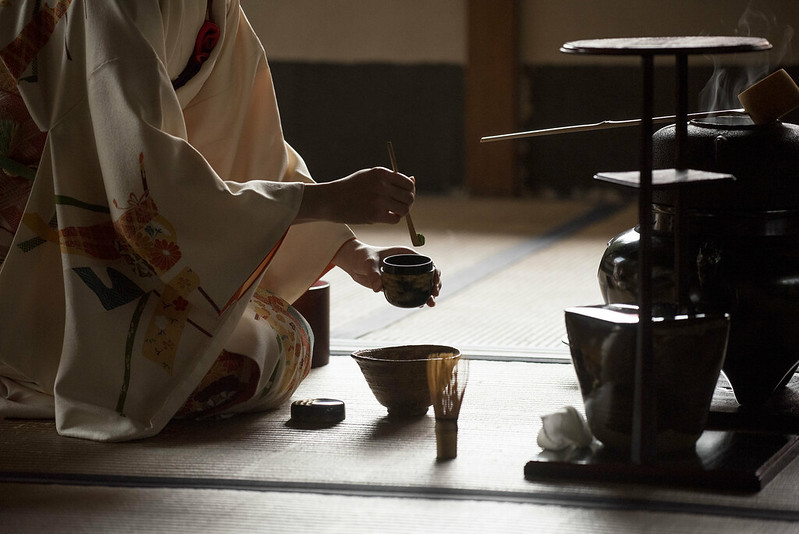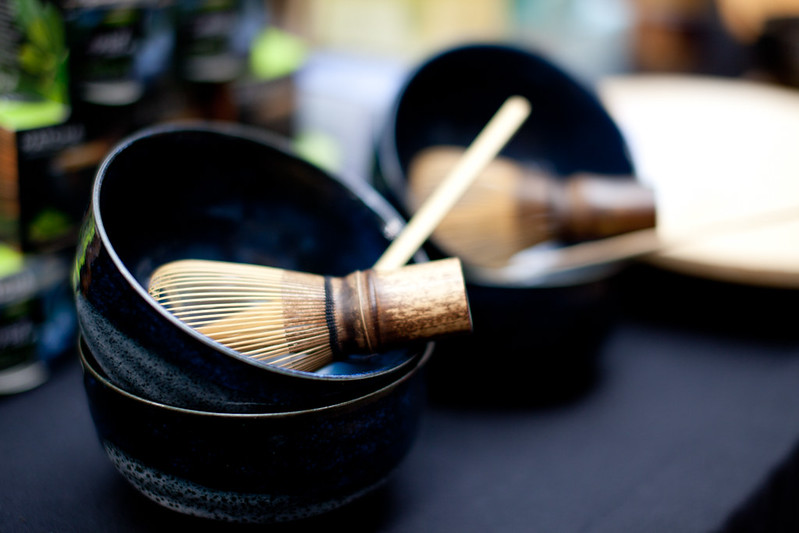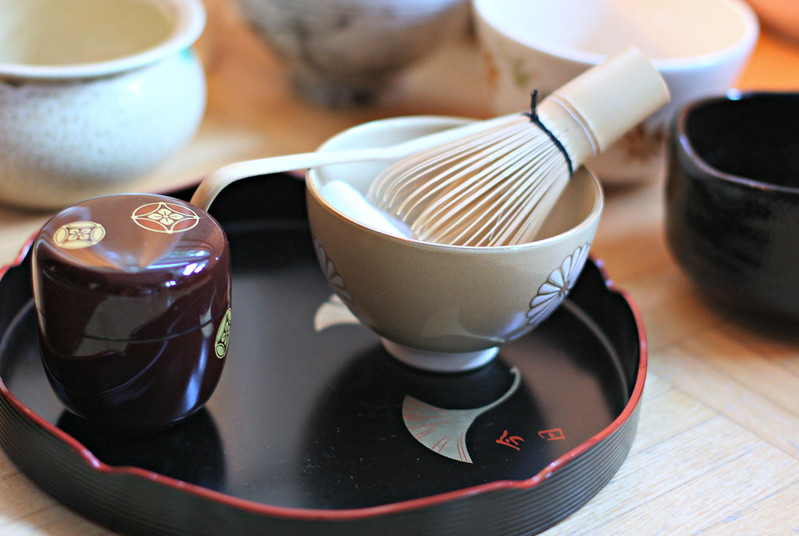Jan 30, 2020
The Way of Tea – Japanese Tea Ceremony in Nagoya
Also referred to as the Way of Tea, the Japanese tea ceremony elevates the preparation and presentation of ‘macha,’ or powdered green tea, to a ceremonial activity of great cultural significance. In the tea ceremony or chanoyu, sadō, or chadō in Japanese, matcha is skillfully and elegantly prepared for guests by an expert host. Every hand movement the host makes is purposeful and graceful and is a precise and disciplined expression honed through years of training.
Becoming a master of this art requires not only mastering the ceremony itself, but also everything that surrounds it. Proficiency in other traditional art forms like calligraphy and flower arranging, as well as knowledge of relevant architecture and gardening, allow a masterful host to select and decorate an appropriate location that will transport their guest outside of their reality, and into the reality of the ceremony.
The tea ceremony embodies the Japanese aesthetic of wabi-sabi, centered on the inherently transient nature of the world around us. This aesthetic is a guiding principle of the Way of Tea and celebrates beauty in that which is imperfect, impermanent, and incomplete. A well-made teacup, old, broken, and repaired is more likely to be revered than a new teacup, for example. All utensils and equipment used to make tea, collectively called chadogu, are carefully selected to complement the ceremony and are frequently changed to reflect the environment of a particular ceremony, a winter, versus a spring ceremony, for example. The basics utensils are:
- Napkin- A special small rectangular white cloth used to wipe the tea bowl.
- Tea bowl- Vary in size and style, and are usually thrown by hand.
- Tea caddy- A small lidded container containing the powdered tea used
- Tea scoop- Used to scoop tea, and are generally are carved from a single piece of bamboo,
- Tea whisk- Used to mix the tea and water, and are typically carved from a single piece of bamboo.
Many of these items can become quite old and revered, with whole museums devoted to the most notable of them. In Nagoya, The Tokugawa Art Museum, and in Tokyo, The Sumitomo Art Museum has extensive collections of tea utensils that embody the Japanese wabi-sabi aesthetic.
Experience The Way of Tea for Yourself
Though the essence of the tea ceremony is one of beautiful simplicity, rather like the matcha itself, the reality is at odds with this concept as the tea ceremony itself is an intricate and detailed experience. Taking part in this centuries-old tradition is one of the highlights of an extended stay in Japan. There are many places across Nagoya – and further afield – at which you can experience the beauty of the Japanese tea ceremony.
Tea Ceremony in Nagoya
Tsuruma Park Kakukaku-Tei
Tel: 05-2731-8590
Where: Tsuruma Park, 1 Chome-1 Tsurumai, Showa Ward (map)
Fee: 500 JPY
Note: April 29 and June 7 is the Spring Citizen Tea Party for 700 JPY. Call 052-733-8340 for details.
Shirotori Garden
Tel: 05-2681-8928
Where: 2-2-5 Atsuta Nishimachi, Atsuta Ward (map)
Note: Satsuki tea drive May 2 to 6 10:00 to 15:30 Hydrangea tea drive 15:30 June 20 to 21 10:00 to 15:30
Showa Art Museum
Tel: 052-832-5851
Where: 4-1 Shiomicho, Showa Ward, Nagoya, Aichi 466-0837 (map)
Note: Coloration tea drive May 3 – 4 13:30 to 15:30

Higashiyama Botanical Gardens
Tel: 052-831-2672
Where: Higashiyama Park, Chikusa Ward, Higashiyama Motomachi, 3 Chome− 7 0 (map)
Note: Citizen tea drive May 5 and June 12, 11:00-15:30 400JPY
Cultural Path Shumokukan
Tel: 052-939-2850
Where: 2 Chome-18 Shumokucho, Higashi Ward (map)
Note: Spring tea ceremony May 16-June 14 500JPY plus 200JPY entry fee.
Yokiso Villa
Tel: 052-759-4450
Where: Chikusa Ward, Hoocho, 2 Chome−5−17 (map)
Note: May 3, 10, 21, 24, 31 for tea drive events. 500JPY admission
Tobe Shrine
Tel: 052-821-2909
Where: Yobitsugi Park, 4 Chome-13-38 Yobitsugi, Minami Ward (map)
Note: May 17-June 21 for Monthly Kettle meeting, 500JPY with a reservation.
Nakamurakoen Cultural Plaza
Tel: 052-411-4565
Where: Takahata-68 Nakamuracho, Nakamura Ward (map)
Note: Contact for details of spring and summer events
Furukawa Art Museum
Tel: 052-763-1991
Where: 2 Chome-50 Ikeshitacho, Chikusa Ward (map)
Note: May 10, 23, June 30 for events. 500JPY
Tokugawa-en Garden
Tel: 05-2935-8988
Where: 1001 Tokugawacho, Higashi Ward (map)
Nagoya Castle
Tel:05-2962-6153
Where: 1-1 Honmaru, Naka Ward (map)
Note: Tea ceremonies are held sporadically throughout the year.
Fee: 800JPY (on day), 600JPY (in advance) plus Nagoya Castle admission fee
Touzan-sou
Tel: 052-831-2672
Where: Mizuho Ward, Hatsuhicho, 2−3 (map)
Note: about once a month on Wednesday
Koshoji Temple
Tel: 052-832-2801
Where: Showa Ward, Yagotohonmachi, 7 8 (map)
Website: koushoji.or.jp

Tea Ceremony in Aichi
Matcha Museum SAIJOEN Waku Waku
Tel: 0563-77-6572 (for reservations 0563-77-6572)
Where: 15 Yokomachiyashiki, Kami-machi, Nishio City (map)
Note: Learn to make tea yourself at this workshop in Nishio, the ‘home of matcha.’ Reservations required.
Website: aijoen.jp
Aichi Prefectural Ceramic Museum – Tea House Tosui-an
Tel: 0561-84-7474
Where: 234 Minamiyamaguchicho, Seto, (map)
Fee: 500 JPY for tea and a sweet
Syodenin Shoin, Urakuen, Inuyama
Website
Tel: 0568-61-4608
Where: Inuyama, gomonsaki 1-banchi (map)
Note: At the time of writing, Urakuen is temporarily closed. Check the website or call to confirm that it has reopened.
Fee: Adult 1000JPY; Children 600JPY
Photo: by rosipaw via flickr.com (CC BY-SA 2.0) -Modified
Photo: by Patrick Vierthaler via flickr.com (CC BY-SA 2.0) -Modified
Photo: by Morten Rand-Hendriksen via flickr.com (CC BY-SA 2.0) -Modified


About the author